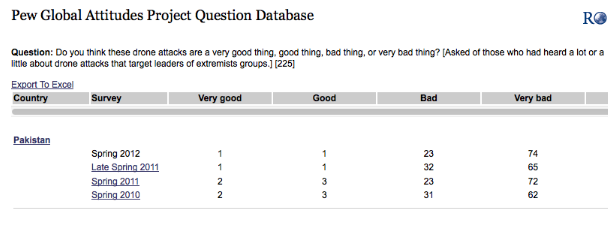Yes, Pakistanis Really Do Hate America's Killer Drones
The only major demographic in the country that doesn't? People who don't know about it.

Here at The Atlantic yesterday, Christine Fair, Karl Kaltenthaler, and William J. Miller argued a claim I'd never encountered about the CIA's drone campaign in Pakistan: "Yes, drone strikes are not very popular among a large section of Pakistani society," they admit. "But Pakistanis are not united in opposition to drone strikes. In fact, many Pakistanis support the drone strikes. This suggests that there is room for the United States to engage in a public diplomacy campaign to win over more Pakistanis to the idea that drone strikes are not the bringers of carnage that is so often portrayed in the Urdu-language media in Pakistan if the United States could be persuaded to bring this worst-kept secret out of the closet and into embassy briefings."
At first, I was skeptical. Humans are typically averse to foreign spy agencies killing their countrymen. Could public diplomacy really rally Pakistanis in favor of drone strikes on their own soil? Could it really disabuse them of the notion that drones bring carnage, given that they do?
Then I read the rest of the piece.
As it turns out, the advice is as dubious as it seems. The authors offer strained interpretations of public opinion data, are strangely confident that U.S. forays into Pakistani public discourse would be successful, and assume human nature is very different than long experience suggests. And the glaring inadequacy of the interventionist worldview is laid bare in their approach.
Here is how they introduce their methodology:
Pew's 2010 report on the drone war declared: "There is little support for U.S. drone strikes against extremist leaders -- those who are aware of those attacks generally say they are not necessary, and overwhelmingly they believe that the strikes kill too many civilians." Drone foes have seized upon these and subsequent survey results and marshaled them as iron-class proof that Washington's drone program faces a wall of Pakistani public opposition... When one examines all of the data gathered by Pew on drones in Pakistan, a very different and much more complex picture emerges about Pakistani attitudes toward various aspects of the American drone program. A more detailed look at the data suggests that that even while some Pakistanis think drones kill too many innocent Pakistanis, they are still necessary.
To get a more complete understanding of Pakistani public opinion, we studied the full range of answers related to drones from the 2010 Pew Global Attitudes Project survey, looking at the respondent-level data. Public commentary has been based upon selective stories about misleading tabulations. For example, a large majority of Pakistanis indicated that the drone strikes killed too many innocents. Drone opponents use this and other questions to link collateral damage to their claim that drone strikes are unpopular. In fact, most Pakistanis were either unaware of the drone program or declined to answer questions about them in 2010. Only 35 percent of the sample professed knowledge of the drone program -- compared to 43 percent who said they knew nothing. The difference is comprised of persons who chose not to answer the question for whatever reason. Most of the drone-critical commentary based upon these 2010 data does not acknowledge that conclusions are being drawn from a minority of all respondents.
The authors are absolutely right: the drone program is unpopular only among the people who know about it. Pakistanis who don't know about it don't think about it in unfavorable terms... or at all!
In that sense, it's like gonorrhea. Folks who know what it is don't like it. But who are we to assume that people who don't have any knowledge of it would be against it too, especially if they found out about the STD through a pro-gonorrhea pr campaign? Of course, drone strikes don't affect their victims in the same way as sexually transmitted diseases -- they're much, much worse.
The authors would surely object to my dismissive characterization. In the interest of fairness, here's more of their argument:
Knowledge of the drone program has grown slightly, as has opposition to it. Spring 2012 data demonstrate that 56 percent of Pakistanis have heard something about the drone program and 21 percent knew nothing about it at all despite the extensive media coverage in Pakistan and beyond. Another 23 percent of respondents declined to say whether they had heard of the drone strikes. Among those who had heard of the program in 2012, 17 percent said that drone strikes are necessary to defend Pakistan from extremist groups (when done in conjunction with the Pakistani government), whereas 44 percent opposed the strikes. While 41 percent who were familiar with the program believe that they are being conducted without their government's approval; 47 percent correctly believe that their government has given its approval for these strikes. Clearly, Pakistani public opinion is not as informed and much less unanimous as commentators often presume. There is not a wall of opposition to drone strikes in Pakistan but a vocal plurality that merely gives that impression.
So the same basic point: among people who know about drones, opponents outnumber supporters by more than two to one, but only 56 percent of Pakistanis know about the drone program. Given these figures and trends, you'd think that proponents of more drone strikes in Pakistan would want as few additional people as possible to know about them. Secrecy is the approach the Obama Administration and Pakistan's government have taken. The authors think they know better.
The explicit advice that they give:
The United States has avoided discussing this program publicly because it is covert. Officials likely suspect that being more transparent about the program will have little effect because they, too, assume that Pakistanis universally oppose the drones. However, our analysis suggests that such assumptions are dead wrong. Pakistanis are indeed responsive to information about this program -- for better or for worse. If the United States wants to make this program sustainable, it will likely have to find ways of being more transparent. The drone war may be a war against militants. But there is also a war for Pakistani hearts and minds about the legitimacy of the war against militancy as well as the means to fight it...
Washington needs to be more assertive and transparent in discussing drone strikes in Pakistan because it must draw to its side the large swath of the population that doesn't even know about the program. This may mean using radio, non-cable TV (including local Pakistani networks) or even hyperlocal media such as SMS -- and it means doing so in Urdu and perhaps other vernacular languages. So far, the United States seems content to communicate with Pakistanis using the language only a miniscule fraction of the country knows: English.
I don't know that I've ever seen a better example of interventionist hubris and naivete than this suggestion. They imagine that the United States is capable of persuading poor Pakistanis to embrace drone strikes with text messages in Urdu and "other vernacular languages"? Yes, perhaps President Obama can tap another former Bush official, Karen Hughes, to oversee the effort. America has had such success in the past changing "hearts and minds" in the Muslim world, what's to say that they couldn't radically transform the popularity of blowing up Pakistanis.
The emphasis on the need for transparency is particularly rich.
How might the truth be phrased?
"Dear Pakistani citizen: American spies are using unmanned killer sky robots to blow up Muslims we suspect of terrorism. Sometimes we know the identities of the people we kill but many times we don't. There are rules governing the drone strikes, but we can't tell you what they are, and the CIA is exempt from them when operating in Pakistan anyway. If you assume that all dead males of military age are militants, as we do, we figure we've killed thousands of militants and only hundreds of woman and children. We don't do anything to compensate the families of the innocents."
Yes, transparency should do the trick.

In conclusion, I'd like to highlight one of the Pew questions that the authors neglect in their article:

Related: 'Every Person Is Afraid of the Drones': The Strikes' Effect on Life in Pakistan